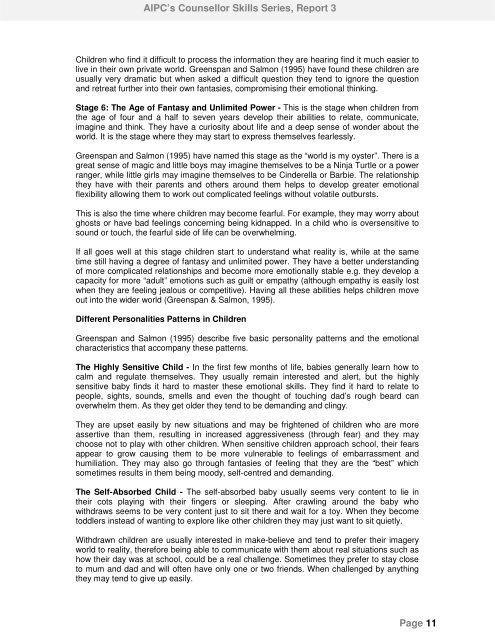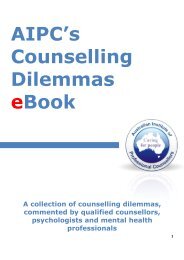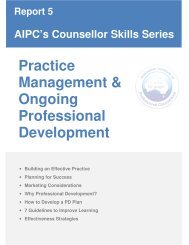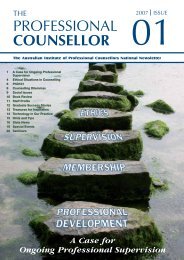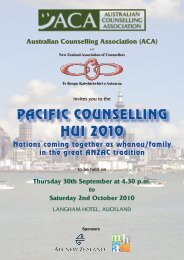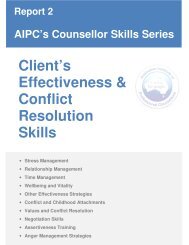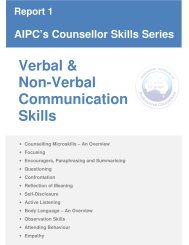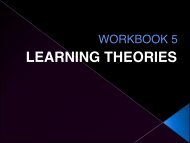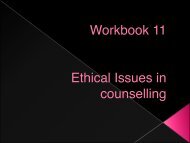AIPC’s Counsellor Skills Series, Report 3WORKING WITH CHILDRENAs children travel through the journey of life they are faced with many differentdevelopmental challenges. Early in life, babies learn to pay attention and be part of arelationship. As they grow they learn to use their imagination and think logically. Greenspanand Salmon (1995) developed a road map outlining the emotional milestones children needto pass through on their way to a healthier, mature personality.They propose that at each stage children learn basic abilities that carry them forward into thenext stage and as children pass through these emotional milestones their ability to think,reason and feel become more advanced.Stage 1: The Ability to Look, Listen and Be Calm - One of the first abilities that all babiesneed is to be calm so that it is possible for them to be interested in and attentive to people,things, sounds, smells and movements. If on the other hand the baby is sensitive to noisesand unexpected hugs they may become overwhelmed and find it more difficult to be calm.Stage 2: The Ability to Feel Close to Others - At this stage children have the ability to feelclose to others. The child’s inner security gives them the capacity to be warm and trusting.On the other hand children who are aloof, withdrawn or expect to be humiliated can becomeisolated and unable to relate to people in a warm trusting way.Stage 3: Two-Way Communication - At the communication stage children learn to readbody language and facial expressions. They also learn to form mental pictures or images sothey may form ideas about their wants, needs and emotions. They are able to feel whetherthey are safe and secure with an adult or whether the adult is dangerous, critical or rejecting.Children who have difficulties understanding facial expressions or changes in vocal tone findit difficult to make these quick and intuitive judgements.Stage 4: Emotional Ideas - At this stage, children can start to exercise their minds, bodiesand emotions as one. They learn how to form mental pictures or images about their wants,needs and emotions and begin to use an idea, expressed in words, to communicatesomething about what they want, feel, or what they are going to do. Having this ability opensa whole new world of opportunities and growth.Children who use emotional ideas in make-believe play e.g. dolls hugging or fighting, ormaking up a story about how another child might be feeling, are making creative leapsbased on this ability to use their imagination. If children are sensitive to visual images and tochanges in vocal tone, a make-believe story e.g. animal faces and strange voices, may befrightening and overwhelming. These children are very nervous about entering into the worldof fantasy and imagination.According to Greenspan and Salmon (1995), children who have problems controlling theiraggression often have difficulty acknowledging their own feelings and expressing the idea ofthose emotions through words. They have found that children who have an action approachto life may have a certain degree of difficulty identifying their intentions and feelings;therefore use aggression as a way to cope with challenging situations.Stage 5: Emotional Thinking - When children reach the emotional thinking stage they gopast labelling a feeling, they become able to think with these images starting to connect anidea and a feeling and recognizing that one is causing the other e.g. they might say “I’mangry today because you didn’t come and play with me”. At this stage children start to makethe distinction between fantasy and reality. They understand more about what is comingfrom inside them and what influences are external to them.Page 10
AIPC’s Counsellor Skills Series, Report 3Children who find it difficult to process the information they are hearing find it much easier tolive in their own private world. Greenspan and Salmon (1995) have found these children areusually very dramatic but when asked a difficult question they tend to ignore the questionand retreat further into their own fantasies, compromising their emotional thinking.Stage 6: The Age of Fantasy and Unlimited Power - This is the stage when children fromthe age of four and a half to seven years develop their abilities to relate, communicate,imagine and think. They have a curiosity about life and a deep sense of wonder about theworld. It is the stage where they may start to express themselves fearlessly.Greenspan and Salmon (1995) have named this stage as the “world is my oyster”. There is agreat sense of magic and little boys may imagine themselves to be a Ninja Turtle or a powerranger, while little girls may imagine themselves to be Cinderella or Barbie. The relationshipthey have with their parents and others around them helps to develop greater emotionalflexibility allowing them to work out complicated feelings without volatile outbursts.This is also the time where children may become fearful. For example, they may worry aboutghosts or have bad feelings concerning being kidnapped. In a child who is oversensitive tosound or touch, the fearful side of life can be overwhelming.If all goes well at this stage children start to understand what reality is, while at the sametime still having a degree of fantasy and unlimited power. They have a better understandingof more complicated relationships and become more emotionally stable e.g. they develop acapacity for more “adult” emotions such as guilt or empathy (although empathy is easily lostwhen they are feeling jealous or competitive). Having all these abilities helps children moveout into the wider world (Greenspan & Salmon, 1995).Different Personalities Patterns in ChildrenGreenspan and Salmon (1995) describe five basic personality patterns and the emotionalcharacteristics that accompany these patterns.The Highly Sensitive Child - In the first few months of life, babies generally learn how tocalm and regulate themselves. They usually remain interested and alert, but the highlysensitive baby finds it hard to master these emotional skills. They find it hard to relate topeople, sights, sounds, smells and even the thought of touching dad’s rough beard canoverwhelm them. As they get older they tend to be demanding and clingy.They are upset easily by new situations and may be frightened of children who are moreassertive than them, resulting in increased aggressiveness (through fear) and they maychoose not to play with other children. When sensitive children approach school, their fearsappear to grow causing them to be more vulnerable to feelings of embarrassment andhumiliation. They may also go through fantasies of feeling that they are the “best” whichsometimes results in them being moody, self-centred and demanding.The Self-Absorbed Child - The self-absorbed baby usually seems very content to lie intheir cots playing with their fingers or sleeping. After crawling around the baby whowithdraws seems to be very content just to sit there and wait for a toy. When they becometoddlers instead of wanting to explore like other children they may just want to sit quietly.Withdrawn children are usually interested in make-believe and tend to prefer their imageryworld to reality, therefore being able to communicate with them about real situations such ashow their day was at school, could be a real challenge. Sometimes they prefer to stay closeto mum and dad and will often have only one or two friends. When challenged by anythingthey may tend to give up easily.Page 11
- Page 3 and 4: AIPC’s Counsellor Skills Series,
- Page 5 and 6: AIPC’s Counsellor Skills Series,
- Page 7 and 8: AIPC’s Counsellor Skills Series,
- Page 9: AIPC’s Counsellor Skills Series,
- Page 13 and 14: AIPC’s Counsellor Skills Series,
- Page 15 and 16: AIPC’s Counsellor Skills Series,
- Page 17 and 18: AIPC’s Counsellor Skills Series,
- Page 19 and 20: AIPC’s Counsellor Skills Series,
- Page 21 and 22: AIPC’s Counsellor Skills Series,
- Page 23 and 24: AIPC’s Counsellor Skills Series,
- Page 25 and 26: AIPC’s Counsellor Skills Series,
- Page 27 and 28: AIPC’s Counsellor Skills Series,
- Page 29 and 30: AIPC’s Counsellor Skills Series,
- Page 31 and 32: AIPC’s Counsellor Skills Series,
- Page 33 and 34: AIPC’s Counsellor Skills Series,
- Page 35 and 36: AIPC’s Counsellor Skills Series,
- Page 37 and 38: AIPC’s Counsellor Skills Series,


